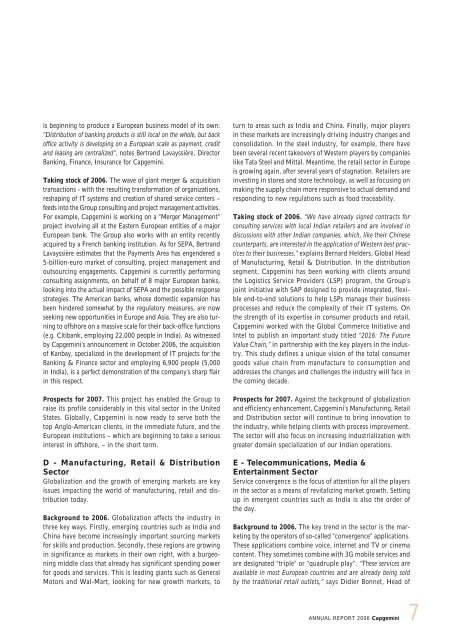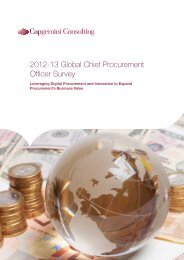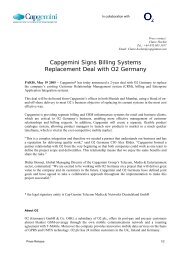You also want an ePaper? Increase the reach of your titles
YUMPU automatically turns print PDFs into web optimized ePapers that Google loves.
is beginning to produce a European business model of its own:<br />
“Distribution of banking products is still local on the whole, but back<br />
office activity is developing on a European scale as payment, credit<br />
and leasing are centralized”, notes Bertrand Lavayssière, Director<br />
Banking, Finance, Insurance for <strong>Capgemini</strong>.<br />
Taking stock of 2006. The wave of giant merger & acquisition<br />
transactions - with the resulting transformation of organizations,<br />
reshaping of IT systems and creation of shared service centers –<br />
feeds into the Group consulting and project management activities.<br />
For example, <strong>Capgemini</strong> is working on a “Merger Management”<br />
project involving all at the Eastern European entities of a major<br />
European bank. The Group also works with an entity recently<br />
acquired by a French banking institution. As for SEPA, Bertrand<br />
Lavayssière estimates that the Payments Area has engendered a<br />
5-billion-euro market of consulting, project management and<br />
outsourcing engagements. <strong>Capgemini</strong> is currently performing<br />
consulting assignments, on behalf of 8 major European banks,<br />
looking into the actual impact of SEPA and the possible response<br />
strategies. The American banks, whose domestic expansion has<br />
been hindered somewhat by the regulatory measures, are now<br />
seeking new opportunities in Europe and Asia. They are also turning<br />
to offshore on a massive scale for their back-office functions<br />
(e.g. Citibank, employing 22,000 people in India). As witnessed<br />
by <strong>Capgemini</strong>’s announcement in October 2006, the acquisition<br />
of Kanbay, specialized in the development of IT projects for the<br />
Banking & Finance sector and employing 6,900 people (5,000<br />
in India), is a perfect demonstration of the company’s sharp flair<br />
in this respect.<br />
Prospects for 2007. This project has enabled the Group to<br />
raise its profile considerably in this vital sector in the United<br />
States. Globally, <strong>Capgemini</strong> is now ready to serve both the<br />
top Anglo-American clients, in the immediate future, and the<br />
European institutions – which are beginning to take a serious<br />
interest in offshore, – in the short term.<br />
D - Manufacturing, Retail & Distribution<br />
Sector<br />
Globalization and the growth of emerging markets are key<br />
issues impacting the world of manufacturing, retail and distribution<br />
today.<br />
Background to 2006. Globalization affects the industry in<br />
three key ways. Firstly, emerging countries such as India and<br />
China have become increasingly important sourcing markets<br />
for skills and production. Secondly, these regions are growing<br />
in significance as markets in their own right, with a burgeoning<br />
middle class that already has significant spending power<br />
for goods and services. This is leading giants such as General<br />
Motors and Wal-Mart, looking for new growth markets, to<br />
turn to areas such as India and China. Finally, major players<br />
in these markets are increasingly driving industry changes and<br />
consolidation. In the steel industry, for example, there have<br />
been several recent takeovers of Western players by companies<br />
like Tata Steel and Mittal. Meantime, the retail sector in Europe<br />
is growing again, after several years of stagnation. Retailers are<br />
investing in stores and store technology, as well as focusing on<br />
making the supply chain more responsive to actual demand and<br />
responding to new regulations such as food traceability.<br />
Taking stock of 2006. “We have already signed contracts for<br />
consulting services with local Indian retailers and are involved in<br />
discussions with other Indian companies, which, like their Chinese<br />
counterparts, are interested in the application of Western best practices<br />
to their businesses,” explains Bernard Helders, Global Head<br />
of Manufacturing, Retail & Distribution. In the distribution<br />
segment, <strong>Capgemini</strong> has been working with clients around<br />
the Logistics Service Providers (LSP) program, the Group’s<br />
joint initiative with SAP designed to provide integrated, flexible<br />
end-to-end solutions to help LSPs manage their business<br />
processes and reduce the complexity of their IT systems. On<br />
the strength of its expertise in consumer products and retail,<br />
<strong>Capgemini</strong> worked with the Global Commerce Initiative and<br />
Intel to publish an important study titled “2016: The Future<br />
Value Chain,” in partnership with the key players in the industry.<br />
This study defines a unique vision of the total consumer<br />
goods value chain from manufacture to consumption and<br />
addresses the changes and challenges the industry will face in<br />
the coming decade.<br />
Prospects for 2007. Against the background of globalization<br />
and efficiency enhancement, <strong>Capgemini</strong>’s Manufacturing, Retail<br />
and Distribution sector will continue to bring innovation to<br />
the industry, while helping clients with process improvement.<br />
The sector will also focus on increasing industrialization with<br />
greater domain specialization of our Indian operations.<br />
E - Telecommunications, Media &<br />
Entertainment Sector<br />
Service convergence is the focus of attention for all the players<br />
in the sector as a means of revitalizing market growth. Setting<br />
up in emergent countries such as India is also the order of<br />
the day.<br />
Background to 2006. The key trend in the sector is the marketing<br />
by the operators of so-called “convergence” applications.<br />
These applications combine voice, internet and TV or cinema<br />
content. They sometimes combine with 3G mobile services and<br />
are designated “triple” or “quadruple play”. “These services are<br />
available in most European countries and are already being sold<br />
by the traditional retail outlets,” says Didier Bonnet, Head of<br />
ANNUAL REPORT 2006 <strong>Capgemini</strong><br />
7















